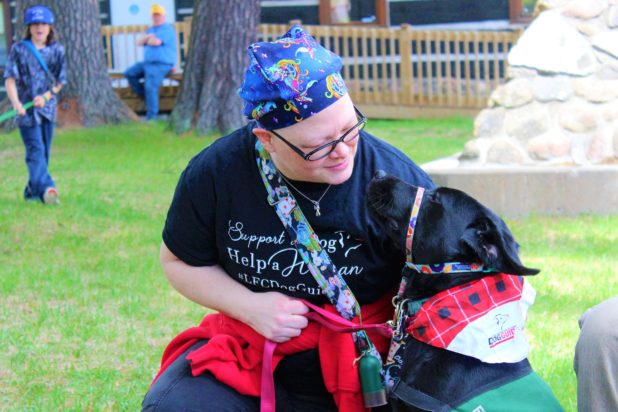Headline News » News
Lions walk for dog guides
May 28, 2019

May 28, 2019
By Nate Smelle
Members of the Bancroft Lions Club gathered in Riverside Park on the afternoon of Sunday, May 26 to Walk for Dog Guides. The annual fundraising drive was one of more than 200 walks taking place across Canada. Through the initiative the Bancroft Lions Club raises funds for Lions Foundation of Canada Dog Guides, a national charity that breeds, trains, and matches service dogs with qualifying applicants. They train service dogs for panic attacks, visually impaired people, people with physical disabilities and those who suffer from seizures.
As the main organizer of the event, Bancroft Lions Club president Laverne Stapley was happy to see the sun shining during this year’s walk. Since getting involved in the program in 2003, Stapley and his wife Janice have fostered 20 guide dogs. He said they are currently fostering a dog named Vara. Speaking to his experience as a foster, Stapley said “We’ve had Vara since she was seven and a half weeks old. We look after them for about 11 months and then they go to a school for their formal training. Not every dog makes it, but we have had 12 graduates of the 20 we’ve fostered.”
Missy Westgate and Jello, the guide dog she is fostering, made the trip from Ottawa to Bancroft to participate in the walk and spend some time at the cottage. Over the years Westgate has fostered 38 dogs and taken part in the Walk for Dog Guides in several communities throughout Ontario. Pointing out that foundation is building a new training facility in Oakville in 2019 to keep up with the growing need for dog guides, she said this year’s Walk for Dog Guides is especially important.
“Last year they graduated 200 teams in the program, so this year the decision was to expand the facilities,” said Westgate.
“The people who receive the working dogs don’t actually pay for them, it is all paid for through fundraising,” explained Westgate.
“It costs $25,000 for the training to get a dog from birth until their graduation. That includes their client coming to stay in Oakville to do their training with the dog.”
The Lions Foundation of Canada Dog Guides has a seven-pronged program to train dog guides to help people with different needs. Westgate said they train dogs for people who are: blind or visually-impaired; deaf or hearing-impaired; living with a physical disability; living with epilepsy; living with Type 1 diabetes with hypoglycemic unawareness; children with autism spectrum disorder; and for use by professional agencies with individuals in traumatic situations. Having fostered so many dogs now through the program, she said every dog takes to the training differently.
“One of the benefits of the seven programs is that a dog that likes to fetch will be great with service where they will be retrieving for someone in a wheelchair,” Westgate said.
“A dog that likes to walk is perfect for canine vision where they will be working with a blind person. A dog who sniffs is good with diabetic alert, where they are smelling the blood sugar. If the dog is especially cuddly and good with kids, then working with a child with autism is good for them. A lot has to do with the dog’s personality … they have to want to work.”


















